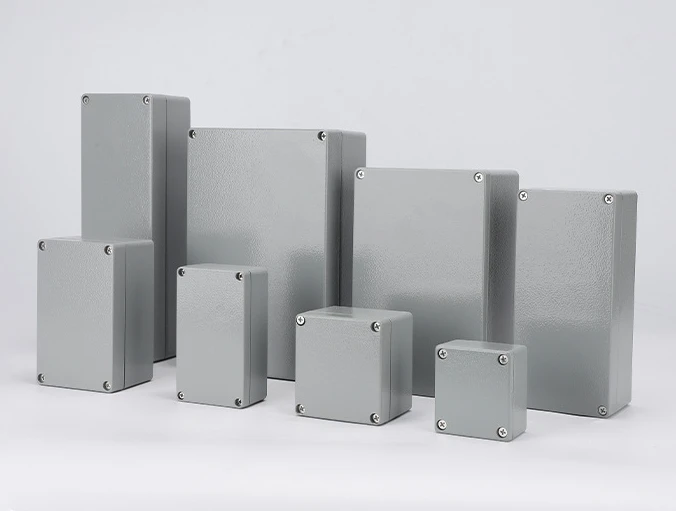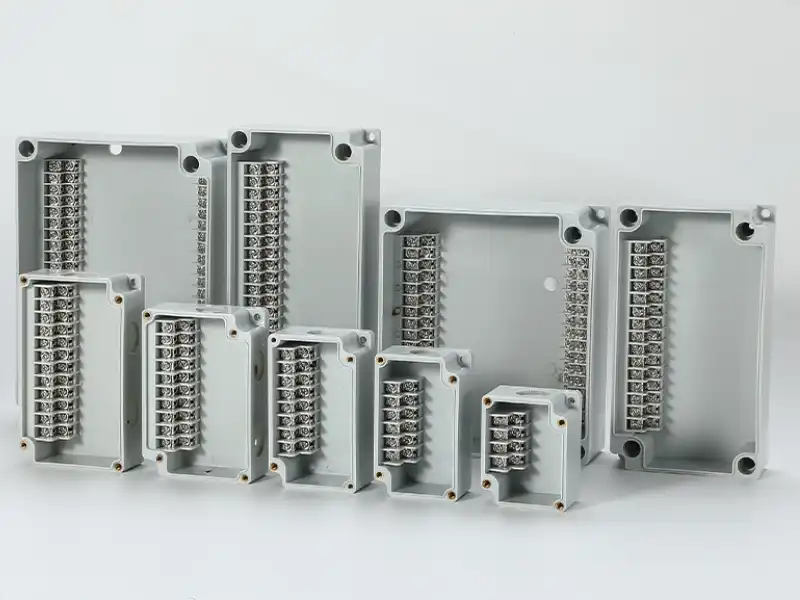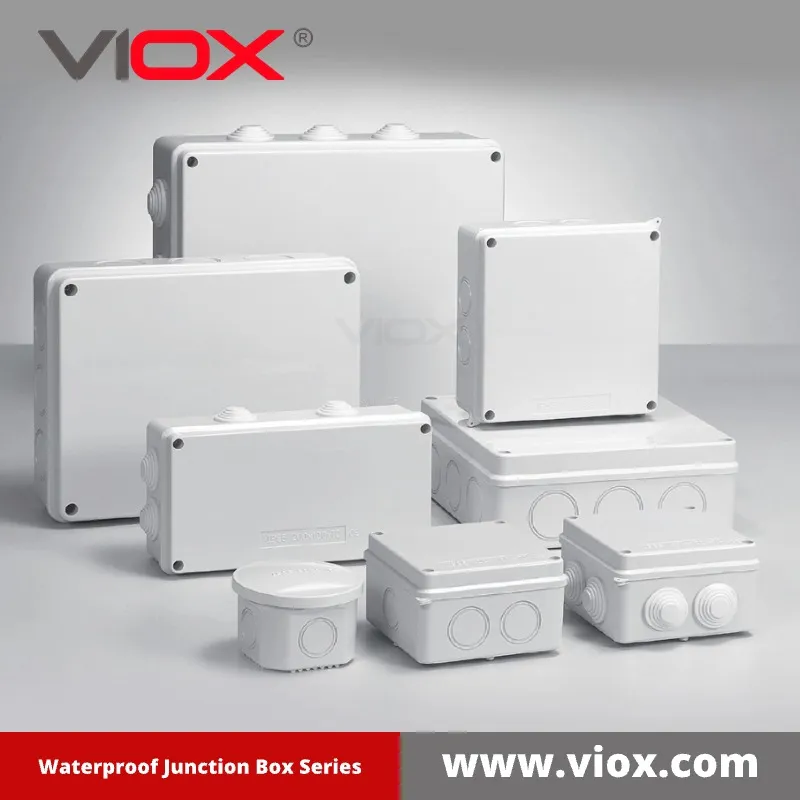ឯកសារយោងរហ័ស៖ សេចក្តីសង្ខេបកូដប្រអប់ប្រសព្វ NEC
តម្រូវការចាំបាច់៖
- ទំហំត្រឹមត្រូវ។ ដោយប្រើការគណនាការបំពេញប្រអប់ NEC 314.16
- ម៉ោនដោយសុវត្ថិភាព ទៅស៊ុមរចនាសម្ព័ន្ធ ឬការទ្រទ្រង់ឯករាជ្យ
- រក្សាភាពងាយស្រួល សម្រាប់ការត្រួតពិនិត្យ និងថែទាំ
- ដាក់ដីឱ្យបានត្រឹមត្រូវ ដោយប្រើវិធីសាស្រ្តសមស្របសម្រាប់ប្រព័ន្ធខ្សែភ្លើង
- សម្គាល់ឱ្យបានច្បាស់លាស់ សម្រាប់ការកំណត់អត្តសញ្ញាណ និងសុវត្ថិភាពនាពេលអនាគត
ទំហំ និងសមត្ថភាពប្រអប់ទូទៅ៖
- 4″ x 4″ x 1.5″: 21 អ៊ីញគូប (ស័ក្តិសមសម្រាប់ខ្សែ 3-4 #12)
- 4″ x 4″ x 2.125″: 30 អ៊ីញគូប (ស័ក្តិសមសម្រាប់ខ្សែ 5-6 #12)
- 6″ x 6″ x 1.5″: 42 អ៊ីញគូប (ស័ក្តិសមសម្រាប់ខ្សែ 8-10 #12)
មាត្រា និងផ្នែកសំខាន់ៗនៃ NEC សម្រាប់ប្រអប់ប្រសព្វ
មាត្រា 314៖ ប្រអប់ព្រីភ្លើង ឧបករណ៍ ទាញ និងប្រសព្វ
ឯកសារយោងកូដចម្បង៖ មាត្រា 314 មានតម្រូវការទូលំទូលាយសម្រាប់ប្រអប់អគ្គិសនីគ្រប់ប្រភេទ រួមទាំងប្រអប់ប្រសព្វផងដែរ។.
ផ្នែកសំខាន់ៗ៖
- 314.16៖ ការគណនាការបំពេញប្រអប់ និងតម្រូវការទំហំ
- 314.23៖ លក្ខណៈបច្ចេកទេសនៃការទ្រទ្រង់ និងការម៉ោន
- 314.29៖ តម្រូវការភាពងាយស្រួល
- 314.17៖ ចំហាយដែលចូលក្នុងប្រអប់
- 314.27៖ ប្រអប់ព្រីភ្លើង (នៅពេលដែលប្រអប់ប្រសព្វបម្រើជាព្រីភ្លើង)
មាត្រា 110៖ តម្រូវការដំឡើងទូទៅ
បទប្បញ្ញត្តិសំខាន់ៗ៖
- 110.12៖ ការប្រតិបត្តិមេកានិច និងស្នាដៃស្អាត
- 110.14៖ ការតភ្ជាប់ និងការបញ្ចប់អគ្គិសនី
- 110.26៖ ការបោសសំអាតកន្លែងធ្វើការ
តម្រូវការប្រអប់ប្រសព្វ NEC សំខាន់ៗ
| ផ្នែកកូដ | តម្រូវការ | ការបញ្ជាក់ |
|---|---|---|
| 314.16 | ការគណនាការបំពេញប្រអប់ | ត្រូវតែផ្ទុកចំហាយ ឧបករណ៍ និងគ្រឿងបរិក្ខារទាំងអស់ |
| 314.23 | ការគាំទ្រ | ភ្ជាប់ដោយសុវត្ថិភាពទៅនឹងរចនាសម្ព័ន្ធអគារ ឬទ្រទ្រង់ដោយឯករាជ្យ |
| 314.29 | ភាពងាយស្រួល | ត្រូវតែងាយស្រួលចូលទៅដល់ - គ្មានគម្របអចិន្ត្រៃយ៍ |
| 314.17 | ការបញ្ចូលខ្សែ | តម្រូវឱ្យមានការគៀបខ្សែ និងការធូរស្រាលត្រឹមត្រូវ |
| 314.40 | ប្រអប់ដែក | តំរូវការនៃការភ្ជាប់ដី និងការភ្ជាប់ |
ការគណនាការបំពេញប្រអប់ (NEC 314.16)
តម្រូវការបរិមាណខ្សែ
បរិមាណចំហាយស្តង់ដារ៖
- 14 AWG៖ 2.00 អ៊ីញគូបក្នុងមួយចំហាយ
- 12 AWG៖ 2.25 អ៊ីញគូបក្នុងមួយចំហាយ
- 10 AWG៖ 2.50 អ៊ីញគូបក្នុងមួយចំហាយ
- 8 AWG៖ 3.00 អ៊ីញគូបក្នុងមួយចំហាយ
ការកាត់កងបរិមាណបន្ថែម
បរិមាណឧបករណ៍ និងគ្រឿងបរិក្ខារ៖
- ឧបករណ៍ភ្ជាប់ខ្សែនីមួយៗ៖ បរិមាណនៃចំហាយធំបំផុតដែលបានភ្ជាប់
- ខ្សែ ឬការគៀបខ្សែនីមួយៗ៖ 0.25 អ៊ីញគូប
- ឧបករណ៍នីមួយៗ៖ ពីរដងនៃបរិមាណនៃចំហាយធំបំផុត
- ចំហាយដីឧបករណ៍៖ បរិមាណចំហាយមួយ (ទំហំធំបំផុត)
💡 ដំបូន្មានអ្នកជំនាញ៖ តែងតែគណនាការបំពេញប្រអប់មុនពេលដំឡើង។ ប្រអប់ដែលចង្អៀតលើសលុបបំពានកូដ និងបង្កើតគ្រោះថ្នាក់ភ្លើង។.
តម្រូវការភាពងាយស្រួលនៃប្រអប់ប្រសព្វ (NEC 314.29)
និយមន័យងាយស្រួលចូលទៅដល់
ប្រអប់ប្រសព្វត្រូវតែងាយស្រួលចូលទៅដល់ ដែលមានន័យថា៖
- មិនចាំបាច់ប្រើឧបករណ៍ សម្រាប់ការចូល
- គ្មានការដកចេញ នៃសម្ភារៈបញ្ចប់អគារ
- ការចូលប្រើច្បាស់លាស់ សម្រាប់ការត្រួតពិនិត្យ និងថែទាំ
- កន្លែងធ្វើការគ្រប់គ្រាន់ យោងតាម NEC 110.26
ការដំឡើងដែលត្រូវបានហាមឃាត់
❌ ការរំលោភលើកូដ៖
- ប្រអប់ប្រសព្វនៅពីក្រោយជញ្ជាំងស្ងួត ឬបន្ទះក្តារ
- ប្រអប់ដែលគ្របដណ្ដប់ដោយក្បឿងពិដានព្យួរដែលត្រូវការឧបករណ៍សម្រាប់ដកចេញ
- ការដំឡើងដែលតម្រូវឱ្យមានការចូលទៅកាន់ជណ្ដើរលើសពី 6 ហ្វីតដោយគ្មានវេទិកាអចិន្ត្រៃយ៍
- ទីតាំងដែលត្រូវបានរាំងស្ទះដោយឧបករណ៍ ឬកន្លែងស្តុកទុក
✅ ការដំឡើងដែលអនុលោមតាម៖
- ទីតាំងបន្ទប់ក្រោមដី ឬលំហរក្រោមផ្ទះដែលមានផ្លូវចូលច្បាស់លាស់
- បន្ទប់ឧបករណ៍ប្រើប្រាស់ដែលមានបន្ទះចូលដែលអាចដកចេញបាន
- លំហរ attic ដែលអាចចូលបានជាមួយនឹងផ្លូវចូលអចិន្ត្រៃយ៍
- នៅពីក្រោយបន្ទះទូដែលអាចដកចេញបាន (សម្រាប់តែលំនៅដ្ឋានប៉ុណ្ណោះ)
តម្រូវការជំនួយ និងការម៉ោន (NEC 314.23)
វិធីសាស្រ្តម៉ោនតាមកម្មវិធី
| ប្រភេទនៃការដំឡើង | វិធីសាស្រ្តជំនួយ | គម្លាតអតិបរមា |
|---|---|---|
| ម៉ោនលើផ្ទៃ | ផ្ទាល់ទៅរចនាសម្ព័ន្ធ | រាល់ 4.5 ហ្វីត |
| ការផ្គុំខ្សែ | ត្រូវការជំនួយឯករាជ្យ | ដូចដែលបានផលិត |
| ម៉ោន flush | ធានាសុវត្ថិភាពដល់ស៊ុម | យោងតាមលក្ខណៈបច្ចេកទេសរបស់អ្នកផលិត |
| ម៉ោនលើពិដាន | គ្រប់គ្រាន់សម្រាប់បន្ទុកដែលរំពឹងទុក | អតិបរមា 4.5 ហ្វីត |
តម្រូវការជំនួយរចនាសម្ព័ន្ធ
ការពិចារណាទម្ងន់ប្រអប់៖
- ប្រអប់ស្តង់ដារ៖ សមត្ថភាពជំនួយអប្បបរមា 50 ផោន
- ឧបករណ៍ធ្ងន់៖ គណនាបន្ទុកជាក់ស្តែងបូកកត្តាសុវត្ថិភាព
- ម៉ាស៊ីនកង្ហារពិដាន៖ តម្រូវឱ្យមានប្រអប់ដែលបានវាយតម្លៃសម្រាប់កង្ហារពិសេស
- ឧបករណ៍ធំៗ៖ អាចត្រូវការជំនួយឯករាជ្យ
⚠️ ការព្រមានអំពីសុវត្ថិភាព៖ កុំពឹងផ្អែកតែលើទ្រនាប់ជញ្ជាំងស្ងួតសម្រាប់ការទ្រទ្រង់ប្រអប់ប្រសព្វ។ ការម៉ោនរចនាសម្ព័ន្ធត្រឹមត្រូវការពារការបរាជ័យនៃចរន្តអគ្គិសនី និងគ្រោះថ្នាក់ភ្លើង។.
ប្រភេទប្រអប់ប្រសព្វ និងកម្មវិធី
ប្រអប់ដែកស្តង់ដារ
កម្មវិធី៖
- ខ្សែភ្លើងលំនៅដ្ឋាន និងពាណិជ្ជកម្មទូទៅ
- ការដំឡើង EMT និងបំពង់រឹង
- ទីតាំងដែលត្រូវការភាពបន្តនៃដី
- បរិយាកាសសីតុណ្ហភាពខ្ពស់។
ការពិចារណាអំពីកូដ៖
- ការដាក់ដីតម្រូវឱ្យយោងតាម 314.40
- ឧបករណ៍ភ្ជាប់សម្រាប់ភាពបន្ត
- ធន់នឹងការ corrosion នៅក្នុងទីតាំងសើម
ប្រអប់ប្លាស្ទិក (មិនមែនលោហធាតុ)
ការប្រើប្រាស់ដែលអនុញ្ញាត៖
- ការដំឡើងខ្សែ NM
- ការងារលំនៅដ្ឋានទីតាំងស្ងួត
- កម្មវិធីវ៉ុលទាប
- ការដំឡើងស្តង់ដារសន្សំសំចៃ
ដែនកំណត់៖
- ត្រូវតែគោរពការវាយតម្លៃសីតុណ្ហភាព
- មិនស័ក្តិសមសម្រាប់បរិស្ថានកំដៅខ្ពស់
- កម្មវិធីពាណិជ្ជកម្មមានកំណត់
តម្រូវការតភ្ជាប់ខ្សែនៅក្នុងប្រអប់ប្រសព្វ
វិធីសាស្រ្តតភ្ជាប់ដែលបានអនុម័ត
ការតភ្ជាប់ដែលអនុលោមតាមកូដ៖
- គ្រាប់លួស (បានចុះបញ្ជី និងមានទំហំត្រឹមត្រូវ)
- ឧបករណ៍ភ្ជាប់ push-in (បំពេញតាមស្តង់ដារ UL)
- គ្រាប់ lever (ឧបករណ៍ភ្ជាប់ទ្រុងនិទាឃរដូវដែលអាចប្រើឡើងវិញបាន)
- ប្លុកស្ថានីយ (កម្មវិធីឧស្សាហកម្ម)
ស្តង់ដារគុណភាពនៃការតភ្ជាប់ (NEC 110.14)
តម្រូវការដំឡើង:
- ការតភ្ជាប់ត្រូវតែមានសុវត្ថិភាពផ្នែកមេកានិច និងអគ្គិសនី
- មិនមានទង់ដែងលាតត្រដាងហួសពីតួភ្ជាប់
- លក្ខណៈបច្ចេកទេសកម្លាំងរមួលត្រឹមត្រូវសម្រាប់ស្ថានីយ
- វត្ថុធាតុដើមដែលត្រូវគ្នា (ទង់ដែងទៅទង់ដែង អាលុយមីញ៉ូមទៅអាលុយមីញ៉ូម)
💡 ដំបូន្មានអ្នកជំនាញ៖ ប្រើគ្រាប់ដងថ្លឹងសម្រាប់ការតភ្ជាប់ដែលត្រូវការការចូលប្រើនាពេលអនាគត។ ពួកវាផ្តល់នូវការតភ្ជាប់ដែលអាចទុកចិត្តបានជាមួយនឹងសមត្ថភាពផ្តាច់ងាយស្រួល។.
តម្រូវការដី និងការភ្ជាប់
ប្រអប់ប្រសព្វដែក (NEC 314.40)
តម្រូវការដី៖
- តម្រូវការតភ្ជាប់ឧបករណ៍ចម្លងដី
- ភាពបន្តដែកតាមរយៈប្រព័ន្ធបំពង់
- ឧបករណ៍លោតភ្ជាប់កន្លែងដែលភាពបន្តត្រូវបានរំខាន
- វីស ឬឧបករណ៍ដីដែលបានចុះបញ្ជី
វិធីសាស្រ្តដាក់ដីតាមប្រភេទនៃការដំឡើង
| វិធីសាស្រ្តខ្សែភ្លើង | តម្រូវការដី | វិធីសាស្រ្តតភ្ជាប់ |
|---|---|---|
| EMT/បំពង់រឹង | តម្រូវការភ្ជាប់ប្រអប់ | ឧបករណ៍លោតភ្ជាប់ ឬឧបករណ៍ដែលបានចុះបញ្ជី |
| ខ្សែ NM | ឧបករណ៍ចម្លងដីទៅប្រអប់ | វីស ឬឃ្លីបដីដែលបានចុះបញ្ជី |
| ខ្សែ MC | គ្រឿងសឹកផ្តល់ដី | ឧបករណ៍ភ្ជាប់ MC ដែលបានចុះបញ្ជី |
| បំពង់ដែលអាចបត់បែនបាន | តម្រូវការដីដាច់ដោយឡែក | ឧបករណ៍ចម្លងដី |
តម្រូវការកូដជាក់លាក់ទីតាំង
ទីតាំងសើម និងសើម
តម្រូវការពិសេស៖
- ប្រអប់ការពារអាកាសធាតុ សម្រាប់ការដំឡើងក្រៅ
- ការបង្ហូរទឹកត្រឹមត្រូវ និងរន្ធបង្ហូរ
- វត្ថុធាតុដើមធន់នឹងច្រេះ និងថ្នាំកូត
- គម្របសមស្រប និង gaskets
ទីតាំងគ្រោះថ្នាក់
តម្រូវការចាត់ថ្នាក់៖
- ទីតាំងថ្នាក់ទី I៖ តម្រូវឱ្យមានប្រអប់ការពារការផ្ទុះ
- ទីតាំងថ្នាក់ទី II៖ ស្រោមការពារធូលី
- ទីតាំងថ្នាក់ទី III៖ ប្រអប់ស្តង់ដារដែលមានការដំឡើងពិសេស
- ការដំឡើងវិជ្ជាជីវៈ ជាកាតព្វកិច្ចសម្រាប់តំបន់គ្រោះថ្នាក់
ការរំលោភកូដទូទៅ និងដំណោះស្រាយ
ប្រអប់ចង្អៀត
បញ្ហា៖ បរិមាណប្រអប់មិនគ្រប់គ្រាន់សម្រាប់ចំនួនឧបករណ៍ចម្លង
ដំណោះស្រាយ៖ គណនាការបំពេញប្រអប់ឱ្យបានត្រឹមត្រូវ ហើយប្រើប្រអប់ធំជាងនៅពេលចាំបាច់
ឯកសារយោងកូដ៖ NEC 314.16
ការដំឡើងដែលមិនអាចចូលដំណើរការបាន
បញ្ហា៖ ប្រអប់ដែលគ្របដណ្តប់ដោយសម្ភារៈសំណង់អចិន្រ្តៃយ៍
ដំណោះស្រាយ៖ ផ្លាស់ទីទីតាំង ឬដំឡើងបន្ទះចូលប្រើប្រាស់ យោងតាមកូដអគារក្នុងស្រុក
ឯកសារយោងកូដ៖ NEC 314.29
ការគាំទ្រមិនត្រឹមត្រូវ
បញ្ហា៖ ប្រអប់ដែលភ្ជាប់តែនឹងជញ្ជាំងស្ងួត ឬការដំឡើងមិនគ្រប់គ្រាន់
ដំណោះស្រាយ៖ ធានាសុវត្ថិភាពដល់ស៊ុមរចនាសម្ព័ន្ធ ឬប្រើប្រព័ន្ធជំនួយឯករាជ្យ
ឯកសារយោងកូដ៖ NEC 314.23
ការណែនាំអំពីការដំឡើងវិជ្ជាជីវៈ
ពេលណាត្រូវប្រើជាងអគ្គិសនីដែលមានអាជ្ញាប័ណ្ណ
ការដំឡើងជំនាញវិជ្ជាជីវៈចាំបាច់៖
- កម្មវិធីពាណិជ្ជកម្ម និងឧស្សាហកម្ម
- បន្ទះសេវាអគ្គិសនី និងការតភ្ជាប់ម៉ែត្រ
- ការដំឡើងទីតាំងគ្រោះថ្នាក់
- ការអនុញ្ញាតក្នុងស្រុក និងតម្រូវការត្រួតពិនិត្យ
ការពិចារណា DIY
ការងារដែលអនុញ្ញាតដោយម្ចាស់ផ្ទះ៖
- ការបន្ថែមប្រអប់ប្រសព្វសាមញ្ញ (ពិនិត្យមើលកូដក្នុងតំបន់)
- ការជំនួសប្រអប់ដែលមានស្រាប់ (ដូចគ្នា)
- ការដំឡើងវ៉ុលទាប
- ត្រូវប្រាកដថាផ្ទៀងផ្ទាត់តម្រូវការលិខិតអនុញ្ញាតក្នុងតំបន់ជានិច្ច
⚠️ ការព្រមានអំពីសុវត្ថិភាព៖ ការងារអគ្គិសនីមានហានិភ័យសុវត្ថិភាពធ្ងន់ធ្ងរ។ នៅពេលមានការសង្ស័យ សូមពិគ្រោះជាមួយអ្នកជំនាញអគ្គិសនីដែលមានអាជ្ញាប័ណ្ណ ដើម្បីធានាបាននូវការអនុលោមតាមកូដ និងសុវត្ថិភាព។.
តម្រូវការត្រួតពិនិត្យ និងសាកល្បង
បញ្ជីត្រួតពិនិត្យការដំឡើងជាមុន
- [ ] ការគណនាទំហំប្រអប់បានបញ្ចប់ និងផ្ទៀងផ្ទាត់
- [ ] ទីតាំងដំឡើងអនុញ្ញាតឱ្យមានលទ្ធភាពចូលដំណើរការដែលតម្រូវដោយកូដ
- [ ] ទ្រទ្រង់រចនាសម្ព័ន្ធគ្រប់គ្រាន់សម្រាប់ការប្រើប្រាស់
- [ ] វិធីសាស្រ្តនៃការដាក់ដីបានគ្រោងទុក និងសម្ភារៈអាចរកបាន
- [ ] លិខិតអនុញ្ញាតក្នុងតំបន់ត្រូវបានទទួល ប្រសិនបើចាំបាច់
ការផ្ទៀងផ្ទាត់ក្រោយការដំឡើង
- [ ] ការតភ្ជាប់ទាំងអស់មានសុវត្ថិភាព និងអ៊ីសូឡង់បានត្រឹមត្រូវ
- [ ] ការបំពេញប្រអប់ស្ថិតនៅក្នុងដែនកំណត់ដែលបានគណនា
- [ ] ភាពជាប់គ្នានៃការដាក់ដីត្រូវបានផ្ទៀងផ្ទាត់
- [ ] បន្ទះចូល ឬគម្របត្រូវបានដំឡើងត្រឹមត្រូវ
- [ ] ការត្រួតពិនិត្យចុងក្រោយត្រូវបានកំណត់ពេល ប្រសិនបើចាំបាច់
ជាញឹកញាប់បានសួរសំណួរ
សំណួរ៖ តើខ្ញុំអាចដំឡើងប្រអប់ប្រសព្វនៅពីក្រោយជញ្ជាំងស្ងួតបានទេ?
ចម្លើយ៖ ទេ។ NEC 314.29 តម្រូវឱ្យប្រអប់ប្រសព្វអាចចូលបានយ៉ាងងាយស្រួលដោយមិនចាំបាច់ដកសម្ភារៈសំណង់ចេញ។.
សំណួរ៖ តើខ្ញុំគណនាដោយរបៀបណា ប្រសិនបើប្រអប់ប្រសព្វរបស់ខ្ញុំមានទំហំធំល្មម?
ចម្លើយ៖ ប្រើការគណនាការបំពេញប្រអប់ NEC 314.16 ដោយរាប់ conductor ឧបករណ៍ និងគ្រឿងបរិក្ខារនីមួយៗ យោងតាមតម្រូវការគូបអ៊ីញដែលបានបញ្ជាក់។.
សំណួរ៖ តើប្រអប់ប្រសព្វផ្លាស្ទិចត្រូវការដាក់ដីដែរឬទេ?
ចម្លើយ៖ ប្រអប់ខ្លួនឯងមិនតម្រូវឱ្យមានការដាក់ដីទេ ប៉ុន្តែ conductor សម្រាប់ដាក់ដីឧបករណ៍នៅតែត្រូវភ្ជាប់ឱ្យបានត្រឹមត្រូវនៅក្នុងប្រអប់។.
សំណួរ៖ តើចម្ងាយអតិបរមារវាងទ្រនាប់ប្រអប់ប្រសព្វគឺជាអ្វី?
ចម្លើយ៖ NEC 314.23 តម្រូវឱ្យមានការទ្រទ្រង់រៀងរាល់ 4.5 ហ្វីតអតិបរមា ជាមួយនឹងការភ្ជាប់ដោយសុវត្ថិភាពទៅនឹងរចនាសម្ព័ន្ធអគារ។.
សំណួរ៖ តើខ្ញុំអាចប្រើ wire nuts នៅក្នុងប្រអប់ប្រសព្វប្រភេទណាមួយបានទេ?
ចម្លើយ៖ បាទ/ចាស ដោយផ្តល់ថាពួកវាមានទំហំត្រឹមត្រូវសម្រាប់ conductor ហើយប្រអប់មានបរិមាណគ្រប់គ្រាន់ យោងតាម NEC 314.16 ។.
ពាក់ព័ន្ធ
របៀបដែលប្រអប់ប្រសព្វប៉ះពាល់ដល់ការផ្គត់ផ្គង់ថាមពល





